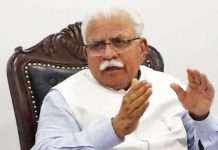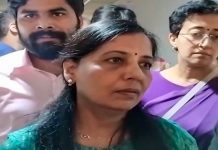Uttar Pradesh is home to Hindu holy sites like Mathura-Kashi and others, which in many ways have functioned as the nerve centre of the BJP’s Hindutva politics. The upcoming parliamentary polls have become a litmus test for the party’s sustained efforts in that direction. A report by Mudit Mathur

Uttar Pradesh has become the laboratory of the “Hindu Rashtra” where saffron forces have long-nurtured big ambitious concept plans and dreams to replace the democratic system of Indian polity governed by the Constitution. Now, Lok Sabha elections have become a litmus test for their sustained efforts in that direction. BJP stalwarts Prime Minister Narendra Modi and Chief Minister Yogi Adityanath have been seen synchronising their election speeches around this narrative aimed to polarise votes in this politically most crucial state which contributes 80 members to the Lok Sabha.
Political observers feel the BJP focus is mainly on sectarian issues which is likely to continue dominating voters’ minds. Uttar Pradesh has become ground zero for a certain type of Hindu-Muslim polarization and its impact on national politics, but the big question is: to which extent Muslim polarization would work to its advantage?.
The BJP campaign is aimed at discrediting opposition parties on the religious issues concerning the majority Hindu community citing their declining of the government’s invitation to attend the consecration ceremony of Ram Temple at Ayodhya. Amid continued victimization of prominent opposition leaders through central investigation agencies for alleged corruption and money laundering, Prime Minister Modi in his election rallies has kept accusing the Congress of making several attempts to stall the construction of the temple in Ayodhya and “insulting” the deity by “rejecting an invitation to the “pran pratishtha” (construction ceremony).
On Varun Gandhi’s turf, Pilibhit, PM Modi reminded them of the 1984 riots and the Congress’s alleged role in the same highlighting how the Samajwadi Party is standing with “this party” for the sake of appeasement politics.
Uttar Pradesh is home to many holy Hindu sites like Mathura-Kashi, which in many ways functioned as the nerve centre of the BJP’s Hindutva politics. The BJP has relied on a multifaceted Hindutva strategy in the state, leveraging socio-religious issues to consolidate its support base and secure electoral victories. The BJP ambitions are too high as the party claims it will win all the 80 seats. UP is the heartland of the Hindutva project [Hindu identity] and thus, the stakes for the BJP are too high in the state to gain power in the country. A setback from this crucial state would be a big symbolic defeat for its Hindutva agenda.
BJP has been promoting a hardcore Hindu agenda in the state through Chief Minister Yogi Adityanath at its helm of affairs who is a Hindu hardliner monk and a senior member of the BJP. Yogi campaigned aggressively for the party in the 2017 elections in Uttar Pradesh and was rewarded by the RSS despite his lack of experience in government. His outfit, Hindu Yuva Vahini attained eminence by demonizing Muslims and by building a strong Hindu base for him. His vigilante group was named often for violence, coercion, and threats against the minority community and was instrumental in bringing him to the central stage of the politics of eastern Uttar Pradesh.
During his tenure, Adityanath has pursued Hindu supremacist policies, replacing names of cities and towns that had a Persian or Islamic origin with Hindu names, revising textbooks to whitewash Mughal history and enacting a law banning “Love Jihad”—the supposed practice of converting Hindu women to Islam, through marriage to Muslim men and ‘Ghar Wapsi’ (religious conversion), which have stirred controversy and communal tensions in UP by targeting certain communities.
The BJP strategized to integrate Hindutva ideology with governance by implementing policies and initiatives aligned with Hindu nationalist principles, such as promoting Sanskrit education, renaming cities with Hindu historical names, and organizing religious festivals with state patronage. It promoted Hindu cultural symbols, traditions, and festivals as integral aspects of Indian identity, emphasizing the need to preserve and promote Hindu heritage. The issue of cow protection further polarised UP religiously where the party has advocated for stricter laws against cow slaughter and promoting initiatives for the welfare of cows.
The preparedness of the INDIA alliance grounds is marred with chaos and confusion due to indecision by the Congress Party which has yet to name its candidates for their pocketboroghs of Amethi and Raebareli, represented in the past by Rahul Gandhi and Sonia Gandhi, sending wrong signals among the electorates.













